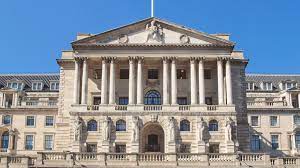There are really only two possible answers to that question, should I invest in today’s stock market? After all, a maybe would be rather dodging matters. The answer is yes – because that’s what investing is. The aim is to build a source of wealth and independence. That’s something that requires continued addition to the stock of investment for that’s just the way the world works.
So, yes, continuing to invest is the correct decision, even in today’s stock markets. However, that those markets are changing will change what is best invested in. Markets always change, that’s actually what they’re for, to be the bellwethers of change in the economy so that’s nothing new. The trick is to grasp what is changing and how, and then position investments ahead of those changes flowing through into prices. This isn’t trivially simple and don’t believe anyone who says it is. But it’s only necessary to be modestly aware of the ongoing changes to be able to get ahead of the game.

Banks And Rising Interest Rates
For example, banks benefit from rising interest rates. The reason is that banks live off the difference between the deposit rate and the lending rate – the interest margin. As no one will deposit at negative interest rates the last decade has seen bank margins artificially compressed and they’re now expanding as interest rates rise.
For example, Lloyds Bank results for HI : “a stronger banking net interest margin of 2.77 per cent” and then Lloyds Q3: “a stronger banking net interest margin of 2.84 per cent year to date (2.98 per cent in the third quarter)” As that’s the difference, that net interest margin, that the banks uses to pay everything then that increasing is great news.

True, not so good is that banks suffer in recessions as loan losses rise. Lloyds just announced they were putting more aside for that too. All of this is going to be true of all of the UK banks but in different proportions. Lloyds is pretty much only a domestic and sterling bank these days, the two effects will be largest for them. Barclays has a large investment bank operation which has other driving forces, HSBC has that huge China and Far East business and so on.
The point is not to say that therefore the British banks are odds on favourites to invest in. Rather, to point out that changing conditions – those rising interest rates – make them much more interesting than they have been for a decade and more. Dependent upon how bad the recession is – and those loan losses – we would expect to see rising dividends and so share prices from the British banks as interest rates rise. But do note that “dependent”.
Inflationary Pressures
The other macroeconomic – by which we mean affecting the whole economy, not just the one company – effect we have to think about is inflation. As the Bank of England admits, a little shamefacedly, this is currently around 5 times what it should be, around 10% not the target of 2%. This is, of course, the explanation for those rising interest rates.

For us as investors the importance is that inflation, as with higher interest rates, makes more money now worth more than something off into the future. Those wonderful adventures which are building the killer technology of the future – say, some of the EV companies – are worth less now in relation to boring and stodgy companies which produce profits right now. Say, supermarkets, or toothpaste and shampoo companies. This is just a function of the value of money. Getting some later is worth less than getting it sooner. So, the relative values of the two business structures change.
Many have forgotten this because it’s near five decades since we’ve had to worry seriously about inflation as a significant factor. But here it is and we have to recall those old lessons. Something producing profits and dividends now is worth more, relatively, than plans to really clean up in some few years’ time. It doesn’t mean those reaches for the skies are worth nothing, just less relative to boring profits right now.
There is though one crushing argument for investing in today’s stock market. Which is inflation. Inflation is money losing its value – so, what can we do to preserve the value of our savings? House prices are about to take a hit from those rising interest rates. Bonds and cash suffer dreadfully from the inflation itself – each pound we have in those this year will be worth less, by the inflation rate, next year. Crypto is having its own interesting times right now. Which leaves just that stock market.
Top Investing Takeaway
Invest for profits and dividends now, reinvest those dividends and that’s what pulled investors through the last inflationary burst back in the 1970s. It might sound a bit like the wisdom of the ancients or something, but stocks are the only financial instrument which do have the ability to beat inflation and higher interest rates together. Therefore, in times of rising interest rates and high inflation yes, we should be investing in the stock market.